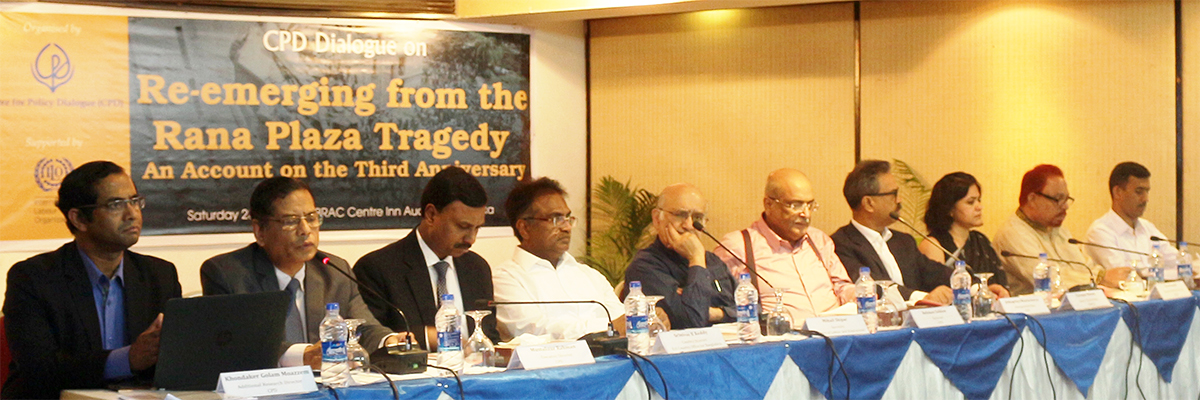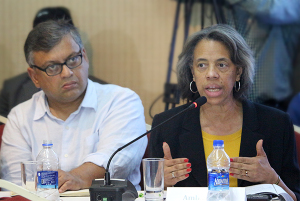
Bangladesh’s RMG sector is slowly heading towards developing a decent working environment. To increase the pace of this development process, a more coordinated and institutionalised approach should be taken by the government so that the country can avoid incidents like Rana Plaza. Emphasis should be laid on institutionalisation of the financial support system for the victims, as well as factory inspection and monitoring process.
Such observation emerged from a CPD dialogue titled Re-emerging from the Rana Plaza Tragedy: An Account on the Third Anniversary organised as part of CPD’s programme ‘Post-Rana Plaza Monitoring: A Civil Society Initiative” held at BRAC Centre Inn on 23 April 2016.

Additional Research Director, CPD, Dr Khondaker Golam Moazzem presented the CPD-ILO study titled Post-Rana Plaza Developments in Bangladesh: Towards Building a Responsible Supply Chain in the Apparels Sector. He focused on remediation of RMG factories, freedom of association, strengthening the organisations; changes in governance in the global apparel value chain and some of the unaddressed issues of Rana Plaza victims and their families.
Dr Moazzem also emphasised on developing responsible supply chain in RMG sector by strengthening the Department of Inspection for Factories and Establishments (DIFE) with adequate capacity. He also suggested to upgrade the Department of Labour (DoL) into the Directorate of Labour to ensure better support to the workers.
As the Chair of the event Professor Rehman Sobhan, Chairman of the CPD, strongly felt that garment workers should be institutionally recognised as partners in the industry by the factory owners. Designating garment workers as the core to the global competitiveness he identified three key factors behind such tragedies- weakness in the governmental agencies, poor mindset of the industry towards workers, and the global market dynamics. He questioned the process of globalisation which makes the $5 product in Bangladesh to be sold at $25 by WallMart.
As the Chief Guest Mr Mikail Shipar, Secretary, Ministry of Labour and Employment, GoB observed that factories being housed in shared and rented buildings are one of the major challenges in the remediation process. Lack of trained human resources is also an obstacle to accelerate the remediation, he added. Mr Shipar acknowledged the need for effective coordination among the factory owners, workers and trade union leaders which he felt is a challenging task.
Mr Srinivas Reddy, Country Director of the ILO Bangladesh Office, present at the dialogue as the Guest of Honour, noted that the post-Rana Plaza situation deserves appreciation but each and every garment factory in Bangladesh should go for inspection and remediation. This is a major message for the country.
Mr Ashraf Zaman Dipu, former Director of BGMEA, stated that the government should be at the driving seat for factory inspection rather than Accord and Alliance. Otherwise these corrective measures will not be effective. Mr Rob Wayss, Executive Director of Bangladesh Operations of Accord on Fire and Building Safety, responded to this by saying that they are just working for a better compliance of the RMG factories. He, however, mentioned that the factory owners can lodge official complaints for any specific allegation, they may have, regarding Accord’s engagement in providing assistance for remediation.
Ambassadors of the United States, Switzerland, Netherlands, France and Spain also spoke among others. Moderated by Dr Debapriya Bhattacharya, CPD Distinguished Fellow the discussion was attended by garments workers, factory owners, ambassadors, development practitioners, economists and non-government organisations.

